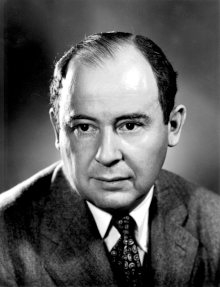J. von Neumann
| John von Neumann |

John von Neumann in the 1940s
|
| Born |
Neumann János Lajos
(1903-12-28)December 28, 1903
Budapest, Austria-Hungary
|
| Died |
February 8, 1957(1957-02-08) (aged 53)
Washington, D.C., U.S.
|
| Citizenship |
Hungary, United States |
| Alma mater |
University of Pázmány Péter
ETH Zürich
|
| Known for |
|
| Spouse(s) |
Mariette Kövesi
Klara Dan
|
| Children |
Marina von Neumann Whitman |
| Awards |
Bôcher Memorial Prize (1938)
Navy Distinguished Civilian Service Award (1946)
Medal for Merit (1946)
Medal of Freedom (1956)
Enrico Fermi Award (1956) |
| Scientific career |
| Fields |
Mathematics, physics, statistics, economics, computer science
|
| Institutions |
University of Berlin
Princeton University
Institute for Advanced Study
Los Alamos Laboratory
|
| Thesis |
Az általános halmazelmélet axiomatikus felépítése ("The general structure of the axiomatic set theory") (1925)
|
| Doctoral advisor |
Lipót Fejér |
| Other academic advisors |
László Rátz |
| Doctoral students |
Donald B. Gillies
Israel Halperin
|
| Other notable students |
Paul Halmos
Clifford Hugh Dowker
Benoit Mandelbrot
|
|
| Signature |
 |
| First few von Neumann ordinals |
| 0 |
|
= Ø |
| 1 |
= { 0 } |
= {Ø} |
| 2 |
= { 0, 1 } |
= { Ø, {Ø} } |
| 3 |
= { 0, 1, 2 } |
= { Ø, {Ø}, {Ø, {Ø}} } |
| 4 |
= { 0, 1, 2, 3 } |
= { Ø, {Ø}, {Ø, {Ø}}, {Ø, {Ø}, {Ø, {Ø}}} } |
John von Neumann (; Hungarian: Neumann János Lajos, pronounced [ˈnɒjmɒn ˈjaːnoʃ ˈlɒjoʃ]; December 28, 1903 – February 8, 1957) was a Hungarian-American mathematician, physicist, and computer scientist. He made major contributions to a number of fields, including mathematics (foundations of mathematics, functional analysis, ergodic theory, representation theory, operator algebras, geometry, topology, and numerical analysis), physics (quantum mechanics, hydrodynamics, and quantum statistical mechanics), economics (game theory), computing (Von Neumann architecture, linear programming, self-replicating machines, ), and statistics.
...
Wikipedia

